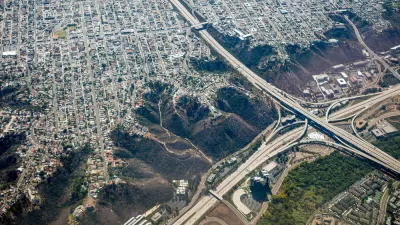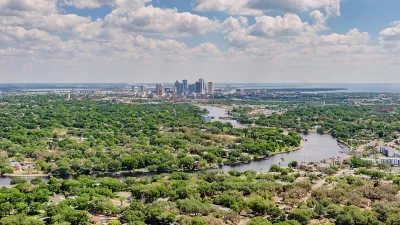A melting economy and struggling suburbs may mean it's time to reconsider how we model our cities and development patterns, according to this column.
"For a half-century we've watched the suburban sprawl machine ooze its ticky tacky across northeastern Illinois with little regard for aesthetics, for the rising cost of energy or, for that matter, the cost of leaving the region's have-nots behind in older, have-not communities."
"We convinced ourselves that nothing could be done about this process because, after all, it's a free country. It's what people want. And the business model-buying up land by the quarter section and selling it by the square foot-was surefire. Everybody made money-the farmers who sold, the developers who bought and built, the mortgage and real estate brokers."
"But wait. Now that the sprawl machine has slowed to a dead stop; now that its life's blood of easy mortgage money flows no more; and now that our trust in the unfailing wisdom of "free men and free markets" has cost us half of our retirement savings, maybe, just maybe, it's time to revisit the inevitability of suburban sprawl."
"But as the housing industry grinds to a halt, and as the "masters of the universe" on Wall Street are revealed to be no smarter than you or I, there is a growing sense that tomorrow's economy need not be modeled on the one that just failed us."
"If the federal government can use our tax dollars to bolster private banks, why can't states, counties and towns require private developers to include some energy efficiency, transit access, walkways and just plain common sense?"
FULL STORY: A brave new (sprawl-free) world

Alabama: Trump Terminates Settlements for Black Communities Harmed By Raw Sewage
Trump deemed the landmark civil rights agreement “illegal DEI and environmental justice policy.”

Planetizen Federal Action Tracker
A weekly monitor of how Trump’s orders and actions are impacting planners and planning in America.

The 120 Year Old Tiny Home Villages That Sheltered San Francisco’s Earthquake Refugees
More than a century ago, San Francisco mobilized to house thousands of residents displaced by the 1906 earthquake. Could their strategy offer a model for the present?

Ken Jennings Launches Transit Web Series
The Jeopardy champ wants you to ride public transit.

BLM To Rescind Public Lands Rule
The change will downgrade conservation, once again putting federal land at risk for mining and other extractive uses.

Indy Neighborhood Group Builds Temporary Multi-Use Path
Community members, aided in part by funding from the city, repurposed a vehicle lane to create a protected bike and pedestrian path for the summer season.
Urban Design for Planners 1: Software Tools
This six-course series explores essential urban design concepts using open source software and equips planners with the tools they need to participate fully in the urban design process.
Planning for Universal Design
Learn the tools for implementing Universal Design in planning regulations.
Clanton & Associates, Inc.
Jessamine County Fiscal Court
Institute for Housing and Urban Development Studies (IHS)
City of Grandview
Harvard GSD Executive Education
Toledo-Lucas County Plan Commissions
Salt Lake City
NYU Wagner Graduate School of Public Service





























